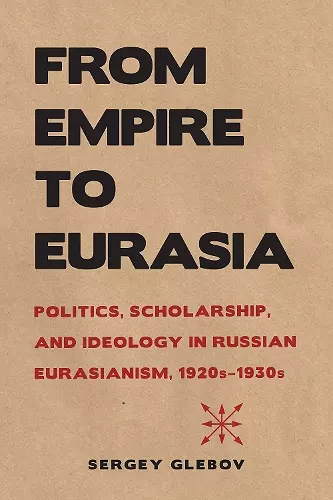From Empire to Eurasia
Politics, Scholarship, and Ideology in Russian Eurasianism, 1920s–1930s
Format:Hardback
Publisher:Cornell University Press
Published:15th May '17
Currently unavailable, and unfortunately no date known when it will be back

The Eurasianist movement was launched in the 1920s by a group of young Russian émigrés who had recently emerged from years of fighting and destruction. Drawing on the cultural fermentation of Russian modernism in the arts and literature, as well as in politics and scholarship, the movement sought to reimagine the former imperial space in the wake of Europe's Great War. The Eurasianists argued that as an heir to the nomadic empires of the steppes, Russia should follow a non-European path of development. In the context of rising Nazi and Soviet powers, the Eurasianists rejected liberal democracy and sought alternatives to Communism and capitalism. Deeply connected to the Russian cultural and scholarly milieus, Eurasianism played a role in the articulation of the structuralist paradigm in interwar Europe. However, the movement was not as homogenous as its name may suggest. Its founders disagreed on a range of issues and argued bitterly about what weight should be accorded to one or another idea in their overall conception of Eurasia. In this first English language history of the Eurasianist movement based on extensive archival research, Sergey Glebov offers a historically grounded critique of the concept of Eurasia by interrogating the context in which it was first used to describe the former Russian Empire. This definitive study will appeal to students and scholars of Russian and European history and culture.
Through careful and insightful analysis of the lives and ideas of these Eurasianists, Glebov provides new perspectives on the Russian, European, and Asian influences that informed their thinking, how they argued over concepts, and how they dealt with the continuing existence of the Soviet state and, ultimately, fell apart. Highly recommended.
* Choice *While earlier studies have covered much of the same territory, Glebov's work stands out by virtue of the depth and the sophistication of its analysis. Perhaps most notable is the author's determination to contextualize Eurasianism by mapping it firmly onto the multiple intellectual, cultural, and political milieux-Russian as well as West European-out of which it developed.
* The Russian ReviISBN: 9780875807508
Dimensions: 229mm x 152mm x 24mm
Weight: 907g
238 pages